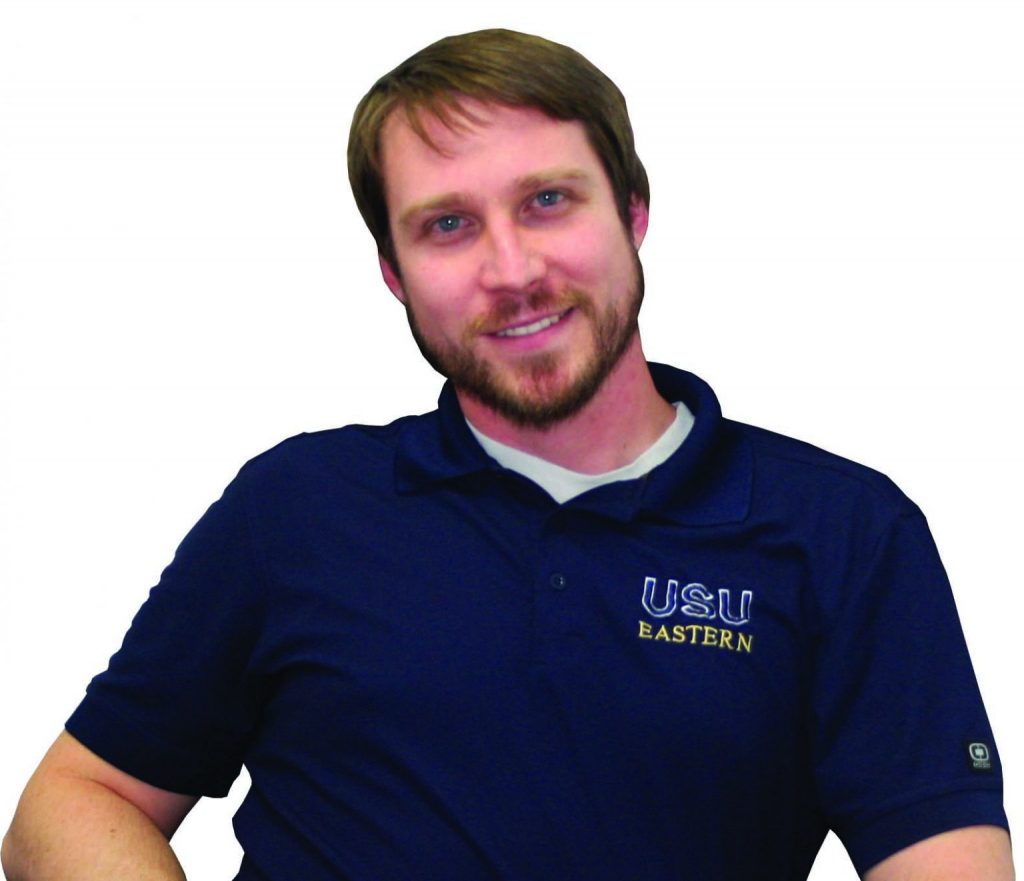If you’re interested in it . . . do it!
Wade Arave is where he is today because he has done what he advises students to do: take advantage of every opportunity. “If you’re interested in it, do it,” he says. His own interests vary, but he says that he enjoys “anything creative.” That’s easy to see given his background. From August 2008 to August 2012, he performed almost weekly with his comedy improve group, “Off the Cuff.” That love for creativity and performance stayed with him.
Arave arrived at USU Eastern last summer and is an admissions advisor in enrollment services.

This archived article was written by: Jonathan Fox
Wade Arave is where he is today because he has done what he advises students to do: take advantage of every opportunity. “If you’re interested in it, do it,” he says. His own interests vary, but he says that he enjoys “anything creative.” That’s easy to see given his background. From August 2008 to August 2012, he performed almost weekly with his comedy improve group, “Off the Cuff.” That love for creativity and performance stayed with him.
Arave arrived at USU Eastern last summer and is an admissions advisor in enrollment services.
In 2009 Arave earned his degree from Southern Utah University in theater and later received his master of fine arts as well. It’s that “creativity” that led him to his first full-time job in his field: teaching theater and production. For three years previous to his time at USU Eastern, he could be found in Cedar City (home to the Shakespearean Festival) where he taught high school drama. He ran the theatre programs at both Canyon View Middle School and Canyon View High School.
“I did two full productions for the high school, and then I did two productions for the middle school. Three musicals and a straight (non-musical) play total,” says Arave. In addition to those four full productions, each year he would take his students to competitions. About one particular year, he said, “It was the first time that Utah had been to nationals in 15 or 20 years.”
The criterion for students going to competition was: “wanting to compete.” If they were working on something specific, they were encouraged to go. Arave has always pushed his students to take advantage of every opportunity that leads to developing a useful skill set and gaining experience needed in the professional world.
It is following his own advice that brought him to USU Eastern. Following the school year of 2011-2012, the Iron County School District was forced to make cuts in their drama department.
“They didn’t close it per say, they just had another teacher, who doesn’t necessarily teach drama, take over my classes.”
However, he says,“I think I’m in a better place . . . as lousy as it was to have my position terminated, it was a really good thing.” In his position as admissions advisor in enrollment services, Arave now has time to devote to his family. “It’s a little longer hours, but off the book hours are much less.”
Arave loves his position because he is still able to be creative. Surprisingly, the skill set that he acquired in his career as a performer and director correlates directly with those of his current position. He can apply his creative mind in the context of a new environment.
His job is to talk to high school students and try to get them to go to college here. “I sell the college,” Arave says. He believes that he has been successful here because of the experiences that he has had.
“My college experience was very similar to the students who go here. As good as book education is, when you get out to start working, really, it’s experience that’s gonna take you to where you need to go. And the small campus provides the experience. Attending a small school, I changed my major half a dozen times and it was ultimately working with professors closely and experiencing what that feels like that led me to doing theatre. [in a bigger school] you make a decision your first two years. . . you find out your junior year that you don’t want to do it, and you’re starting over.”
That’s what Arave tells prospective students, and that is what he believes because it has proven true in his experience. He urges all students – current or prospective – to “do everything and anything you possibly can. If you’re interested in it, do it. Try it. Don’t . . . waste away your experience. College isn’t just about getting a degree at the end. . . the sooner you start working, the sooner you start creating, the better your education is going to be, the more skill sets you’re gonna have, the better off you are once you graduate.”




